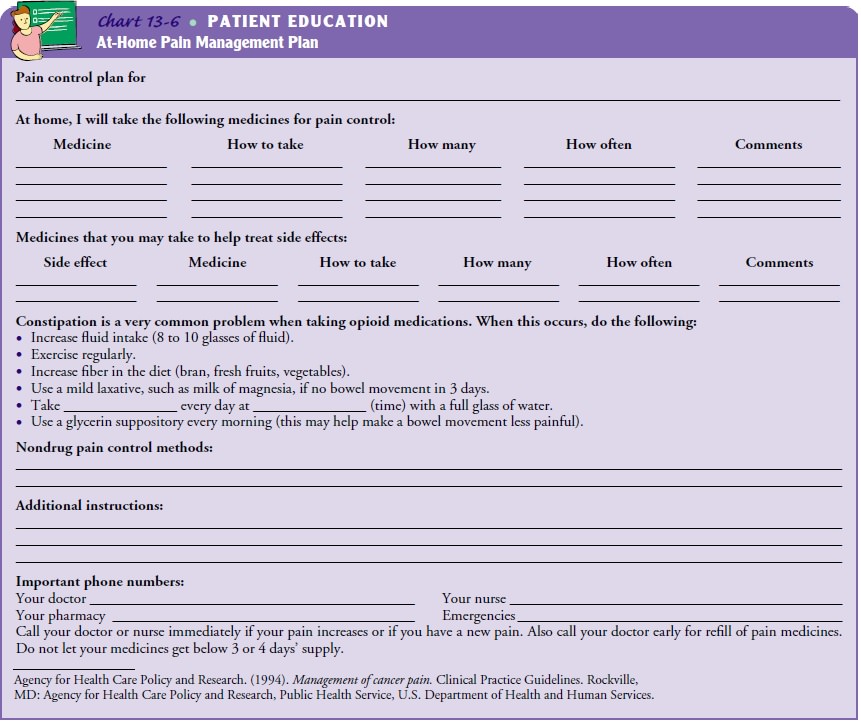Chapter: Medical Surgical Nursing: Pain Management
Promoting Home and Community-Based Care
Promoting Home and Community-Based Care
In preparing the patient and family to manage pain at home, the patient
and family need to be taught and guided about what type of pain or discomfort
to expect, how long the pain is expected to last, and when the pain indicates a
problem that should be re-ported. The person who has experienced acute pain as
a result of injury, illness, procedure, or surgery will probably receive one or
more prescriptions for analgesic medication.
TEACHING PATIENTS SELF-CARE
The patient and family
need to understand the purpose of each medication, the appropriate time to use
it, the associated side ef-fects, and the strategies that can be used to
prevent these prob-lems. The patient and family often need reassurance that
pain can be successfully managed at home.
Inadequate control of
pain at home is a common reason people seek health care or are readmitted to
the hospital. When chronic pain exists, anxiety and fear are often intensified
at the time the patient is about to return home. The patient and family are
instructed about the techniques for assessing pain, using pain assessment
tools, and administering pain medications. These instructions are given
verbally and in writing (Chart 13-6).

Opportunities are provided for the patient and family mem-bers to
practice administering the medication until they are com-fortable and confident
with the procedure. They are instructed about the risks of respiratory and
central nervous system depres-sion associated with opioids and ways to assess
for these compli-cations. If the medications cause other predictable effects,
such as constipation, the instructions include measures for preventing and
treating the problem, as described earlier. Steps are taken to en-sure that the
needed medications are available from the local phar-macy so that the patient
receives the medication when required.
Education for patients and families must stress the need for keeping analgesic agents away from children, who might mistake them for candy. Elderly patients may become lax about this be-cause no children live in the home, but visiting children can be placed at risk. Additionally, analgesic agents must be kept away from other family members who may take them inadvertently. Further, analgesic medications should be stored safely and out of sight to prevent others from taking them for their own use or for diverting them to others.
CONTINUING CARE
If the patient is to receive parenteral or intraspinal analgesia at
home, a referral to a home care nurse is indicated. The home care nurse makes a
home visit to assess the patient and to determine if the pain management
program is being implemented and if the technique for injecting or infusing the
analgesic agent is being car-ried out safely and effectively. If the patient
has an implanted in-fusion pump in place, the nurse examines the condition of
the pump or injection site and may refill the reservoir with medica-tion as
prescribed or may supervise family members in the proce-dure. Any change in the
patient’s need for analgesic medications is assessed. In collaboration with the
physician, the nurse then as-sists the patient and family in modifying the
medication dose. These efforts enable the patient to obtain adequate pain
relief while remaining at home and with family.
As tolerance develops, ever-increasing amounts of opioids are needed. It
is important to assure the patient and family that slowly increasing doses will
not cause an increased risk of respi-ratory depression and central nervous
system depression, be-cause the patient will become tolerant to these effects
also. However, the patient will not become tolerant to the constipat-ing
effects of opioids and will require increased efforts to prevent constipation.
Related Topics